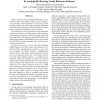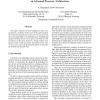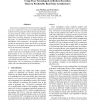89 search results - page 7 / 18 » Obstacles in Worst-Case Execution Time Analysis |
102
click to vote
RTAS
2005
IEEE
15 years 5 months ago
2005
IEEE
While caches have become invaluable for higher-end architectures due to their ability to hide, in part, the gap between processor speed and memory access times, caches (and partic...
121
click to vote
DAC
2003
ACM
16 years 23 days ago
2003
ACM
Schedulability analysis of real-time embedded systems requires worst case timing guarantees of embedded software performance. This involves not only language level program analysi...
104
click to vote
DATE
2000
IEEE
15 years 4 months ago
2000
IEEE
This paper examines several techniques for static timing analysis. In detail, the first part of the paper analyzes the connection of prediction accuracy (worst case execution tim...
104
click to vote
ISSS
1998
IEEE
15 years 4 months ago
1998
IEEE
False path analysis is an activity with applications in a variety of computer science and engineering domains like for instance high-level synthesis, worst case execution time est...
110
click to vote
RTAS
2008
IEEE
15 years 6 months ago
2008
IEEE
Instruction scratchpads have been previously suggested as a way to reduce the worst case execution time (WCET) of hard real-time programs without introducing the analysis issues p...



